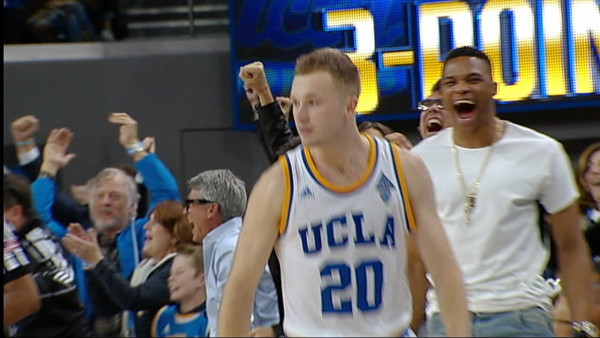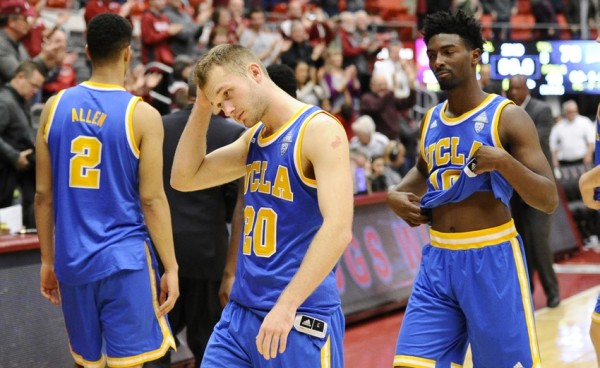UCLA: Predictably Unpredictable?
Posted by Andrew Murawa on January 8th, 2016Conventional wisdom on UCLA, after taking down KenPom #16 Arizona on Thursday night to pair with earlier wins over then-#2 Kentucky and then-#19 Gonzaga, is that the Bruins are inconsistent and unpredictable. And conventional wisdom, as is often the case, may only be partially right. The more complete argument may be that the Bruins are consistent in their inconsistency and predictable in their unpredictability. This isn’t one of those riddle, wrapped in a mystery, inside an enigma bits of nonsense. There’s a method to UCLA’s madness. Let’s dig in.
First, let’s take a look at the current landscape of college basketball. Again, using those KenPom rankings, Virginia is ranked sixth in the nation and has lost road games to George Washington (#72) and Virginia Tech (#119). Miami is ranked 10th and the Hurricanes took a home loss to Northeastern (#81). North Carolina was the AP preseason #1 team and currently ranks 11th in KenPom; the Tar Heels have suffered road losses to Northern Iowa and Texas. Dig a bit further down the rankings and there are many other examples of big-time teams losing to small-time teams. It’s been said that there aren’t any great teams this year, and that may well be true (although reserving that judgment until all of the classwork is in might be in order), but more to the point, there just may be less of a difference this season between the top team and the 50th-best team in the country than ever before. And perhaps more to the point, there is almost assuredly less difference between a team like the 10th-best team and the 90th-best team. In other words, big time teams are susceptible to taking losses against lesser ones, especially when they go on the road.
So, let’s take that idea and apply it to UCLA’s schedule. The Bruins are ranked 57th in the nation by KenPom’s metrics. They’ve got six losses. It started on opening night with an overtime home loss to Monmouth, a team that has, since then, proven itself to be every bit of UCLA’s equal on the floor. The other five UCLA losses have come away from Pauley Pavilion. There was a loss in Maui to Kansas (#2), followed by a loss the next night in a possible hangover-syndrome game to Wake Forest (#100). They lost in Brooklyn to North Carolina (#11). Then they opened Pac-12 play with a double-overtime road loss at Washington (#109), backed up by another potential hangover-syndrome loss at Washington State (#117). Again, to summarize, the Monmouth loss, an understandable loss in Maui, followed by a letdown loss. Then the understandable loss to Carolina, a loss in double-overtime to a talented conference foe, followed by another letdown loss.
What makes the Bruins seem inconsistent and unpredictable are those wins mixed in over Kentucky, Gonzaga and Arizona, elite programs on the national landscape. But here’s the dirty little secret this year: None of those three teams are up to their normal caliber. Kentucky looked great early in the season against Duke, but since then has taken on three losses against teams ranked between #46-#56 nationally. Gonzaga is a team that has scored only one resume-enhancing win in non-conference play and could possibly need a WCC Tournament title in order to earn an NCAA Tournament bid. And while Arizona may be the best of those three teams, this is certainly not a team that is loaded down with pros in the same way recent Sean Miller teams have been. Throw in the fact that the wins over the two Wildcats teams were at home, while the road win at Gonzaga came when the Bulldogs were without Przemek Karnowski, and those wins aren’t quite as stunning anymore. To tie it all back to that first paragraph, there’s a predictability to the perceived unpredictability of these losses. This is a young team in the middle of the national pack (at least in the middle of the top of the national pack) that loses games away from home against slightly lesser-talented foes and wins games at home against slightly more-talented ones.
But there’s even more to UCLA’s predictable unpredictability. Yes, the Bruins have a talented roster. Avoiding specific NBA projections, let’s just say there are guys on this team that are going to be playing plenty of professional basketball down the line. Yes, they’ve got roster balance, with three bigs averaging better than 49 percent of their total minutes and three guards averaging better than 78 percent. And they’ve got guys capable of exploding for big games. But there’s some consistently inconsistent performance built into this roster.
Senior center Tony Parker is a bull in the paint, pulling down rebounds at a high rate on both ends (20.7 DR% and 15.8 OR%, the latter good for 21st in the nation) and taking 73.3 percent of his field goal attempts right at the rim and converting 57.3 percent of those. Those are all excellent numbers, balanced out by the fact that he gets whistled for 4.7 fouls per 40 minutes he’s on the floor. Historically, he’s gotten in early foul trouble in UCLA’s biggest games, an issue he’s cut down on some this year. Still, in those six losses, his minutes were limited at least slightly in five of them. Bryce Alford is plenty capable of getting hot and shooting his team to victory, whether by volume or timing. But he’s also such a streaky shooter that when he has an off night, its hard for the Bruins to recover. For example, in those six losses, Alford has shot an awful 30.5 percent eFG. In the other 10 games, he’s shot a 54.9 percent eFG. One more: freshman point guard Aaron Holiday has committed 22 turnovers in the six losses versus a total of 23 in the 10 wins. Inconsistency on the individual level leads to consistent inconsistency on the team level.
And let’s take it one step further in pointing out the predictability of UCLA’s so-called unpredictability. Last Friday night at Washington, Alford had been struggling his way through one of those nights that occasionally happens on the road in conference play. Unfamiliar background, raucous crowd, or just one of those nights – you pick the culprit. The fact is that Alford missed his first 11 shots from the field and didn’t put in a field goal until there were fewer than five minutes remaining in the game. Yet with his team down three points and 19 seconds on the clock, every single person in the Hec Ed Center (I don’t care what the official name of the building is) knew who was going to get the ball. And the fact that this shot went in was pretty much predictable. Fast forward four minutes and 57 seconds of game time later, 22 seconds on the clock and UCLA down three following an Andrew Andrews free throw. Again, it was completely predictable who the Bruins were going to and completely predictable the result of that play.
So, after a thousand words or so of setup, let’s jump ahead to last night with a textbook example of burying the lede. UCLA is a good but not great team with plenty of talent prone to inconsistency. The Bruins were hosting an Arizona team that is well-coached and very good, but missing the type of elite talent we’ve come to expect down in the desert. Pauley Pavilion is filled to a level that it only sees a few times a year. Russell Westbrook is in the house, giving a pre-game pep-talk to the team and prepping for a half-time ceremony. All signs point to UCLA riding that homecourt advantage to a very good effort. When UCLA dials up that predictable effort, is that unpredictable? Is that inconsistent? Jump ahead about 36 minutes worth of game time. UCLA’s up 10 points at the final media timeout, and it’s been cruising through much of the second half. But, this is UCLA/Arizona, where weird things happen. UCLA starts to take the air out of the ball, paying a bit more attention to the clock than to scoring. When its offense dries up and Arizona gets some hoops on attacks of the rim, is that unpredictable? And then, finally, after the game winds up tied in the final 30 seconds; after the two teams trade nerve-wracked free throw splits on either end of the court; after UCLA calls a timeout with 11 seconds left in a tie ball game: Who do you think is going to wind up with the ball in his hands with the shot clock running down? Unpredictably predictable.












































